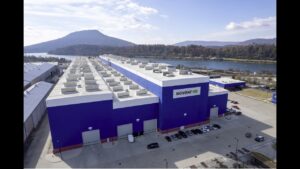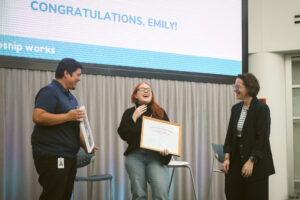NATALIA PEREZ, MARKETING AND COMMUNICATIONS INTERN
Based in Chattanooga since 1972, Astec Industries Inc. and its market leading brands have become global leaders in the manufacture of equipment for asphalt road building and aggregate processing.
Recently, we sat down for a virtual chat with Barry Ruffalo, Astec President & CEO, and talked about the culture at Astec, why Chattanooga is a great place to work and the biggest impacts of the pandemic.
People, The Most Important Resource
Astec Industries facilities can be found in several locations domestically and internationally, with seven of them based in Chattanooga. With Astec’s legacy and historical roots deeply tied to our area, the company’s most significant presence is in Chattanooga, with about a third of 3,800 employees residing locally.
People are Astec’s most important resource, and their passionate, talented employees reflect Astec’s customer-oriented culture.
“The best part about working at Astec is clearly the people,” Ruffalo says. “When I first started at Astec, the things that attracted me most were their core values. I liked that we were a legacy company, the quality of our products, our customers’ passion for our products and that we are customer oriented. The types of employees we have and the passion and pride they have around what they do, and being part of the legacy — that’s a big part of it.”
Recently, Astec has been recruiting a lot of talent to our region, with 11 out of 12 members of their executive leadership team — not including Ruffalo, who was also recruited late 2019 — recruited into Chattanooga within the past year.
Selling Chattanooga is easy for Ruffalo.
“They've all been very excited to come and live in this region,” he says. “We’ve done a lot of recruiting from outside. There’s also a lot of talent in Chattanooga. The workforce is well-trained, we’ve got a reasonable cost of living and there are fantastic things that come with the region — like the outdoor activities.”
Focusing on Diversity and Inclusion
Astec’s three strategic pillars are Simplify, Focus and Grow, and the team’s focusing on not only growing a solid team and network, but on building a foundation of diversity and inclusion, something Ruffalo shares he believes hasn’t had enough focus in the past.
“I would say that we've done a great job over the last year with making that part of our process of bringing in diversity and inclusion to our company,” Ruffalo says. “But now we're starting to formalize more of that, and we think that there's a big opportunity to do more and, and really grow our value as an organization by making it a bigger part of our recruitment and retention process.”
Navigating the Pandemic
COVID-19 has changed the way many industries, organizations and businesses work, and the infrastructure and aggregate industries have been no different.
Astec customers, who are mainly in highway, civil construction and industrial sites. among other industries, are dependent upon federal, state or local funding, and a big portion of that comes from taxes–specifically gas taxes. As people have driven less during the pandemic, they consume less gas, and state gas tax revenue to support road construction has been reduced as a result.
This has affected the market, as some customers are cautious about investing in capital projects, whether they’re an asphalt plant, construction equipment or new concrete plants.
Nonetheless, Astec’s share price has grown this year. The company has launched new products and acquisitions, while remaining attentive to both cost reduction and protecting employees and their families.
One of Astec’s first moves after the pandemic struck was to enact a COVID-19 taskforce, which focuses on risk mitigation for employees. A 39-page COVID-19 playbook acted as a central repository for policies and procedures, emphasizing CDC and local guidelines.
Before the pandemic shook the world, Astec had already implemented Microsoft Teams for effective virtual communication with facilities abroad, like those in Belo Horizonte, Brazil; Johannesburg, South Africa; Omagh, Northern Ireland and more. This made for the transition to managing global operations remotely much smoother, supporting their mission in continuing to provide reliable and safe equipment for the industries served, coupled with unparalleled customer service.







